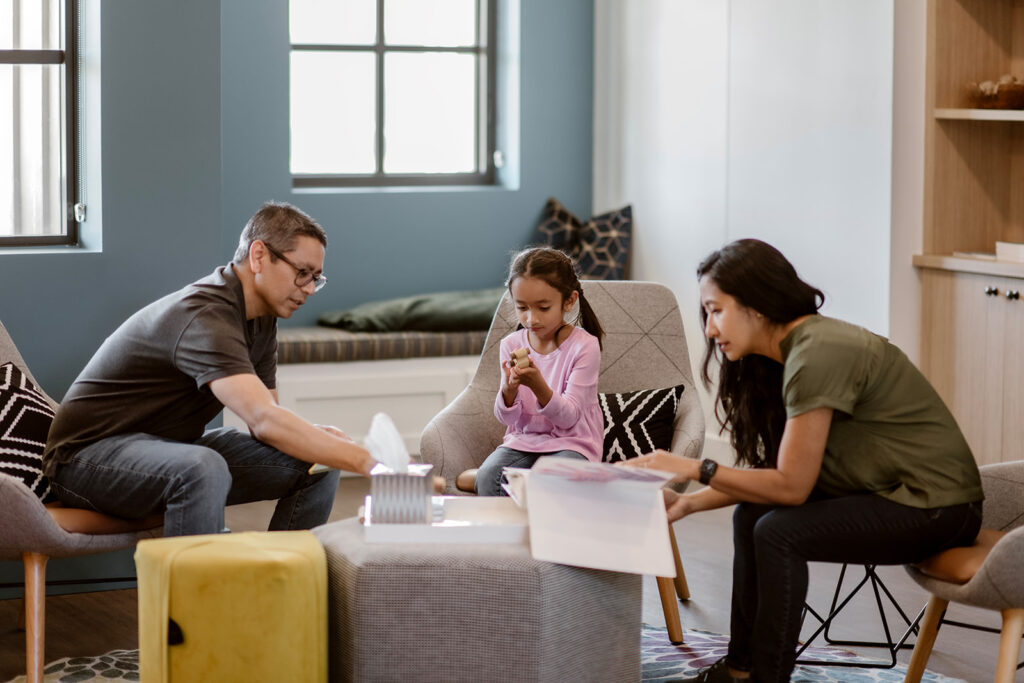
Resources for Grieving Families and Children
The death of a parent or sibling is one of the most difficult experiences in a child’s life – and with 1 in 12 U.S. children projected to experience a death loss before adulthood, it’s important that society provides support and understanding. If you or your child is grieving the loss of a special person, please know that you are not alone. There are many resources available to help you and your family cope with your grief on your healing journey.
Through the 1 in 12 campaign, JAG Institute is committed to providing resources to help grieving families navigate these painful moments. Below, you will find helpful resources on topics such as the grief process, how to talk to children about death, and coping with difficult emotions. You can also visit the National Alliance on Children’s Grief website to find grief counseling services and support groups in your area.
Tools to support the 1 in 12 children who will experience grief
How to talk about death with children & common reactions
Explaining death to kids
This resource assists adults in navigating the challenging task of explaining death to children. Learn how to address tough questions and break down the complex topic of death into easily digestible information. The resource also offers age-appropriate language for explaining various causes and types of death, including murder, overdose, suicide, kidney failure, aneurysm/stroke, cancer and heart attack.
View the guideCommon grief reactions
This resource offers insights into common grief reactions experienced by individuals of all ages, including children, teens and adults. It highlights a wide range of emotional, cognitive, physical and behavioral responses to loss, emphasizing that these reactions are natural and understandable. Learn more about the feelings, thoughts, body reactions and behaviors that are commonly associated with grief.
View the guideWhy and how to talk about death with children
This resource helps caregivers understand why it is important to talk about death with children and offers insight on how to discuss it. It emphasizes the benefits of truth-telling for children’s development and offers practical insights, including maintaining control, creating a narrative and addressing feelings of fault.
View the guideHaving conversations about cause of death with children
This resource offers guidance for caregivers and families facing the challenge of discussing the true cause of a loved one’s death with children. It highlights the importance of telling the truth, emphasizes the benefits of open and honest communication and provides reasons for choosing this path to support grieving children.
View the guideExplaining illness associated with death to children and addressing their fears
This resource offers guidance on explaining the concepts of physical and mental illness, genetics, and communicable diseases to children who may be concerned about catching an illness after the death of someone special. It emphasizes the use of concrete language and encourages open communication with children, allowing them to ask questions even when answers may not be readily available. Read about simple explanations of the concept of illness, how to reassure children about their safety and well-being and tips to validate their feelings while maintaining age-appropriate language.
View the guideElmo’s Question and the Unspoken Language of Grief: Why Open Communication is Essential for Supporting Grieving Children
How are you really doing? A loaded question for people who are grieving
This week, a simple question from the beloved red monster Elmo sparked a global conversation about mental well-being. In a new post from Micki Burns, Ph.D., Chief Clinical Officer and Incoming CEO of Judi’s House, she takes a closer look at Elmo’s question and examines why open communication is essential for supporting grieving children.
Read on to learn more about how resources like Sesame Workshop‘s new grief resources (which launched in partnership with the New York Life Insurance Company Foundation’s this week) and Judi’s House can create the safe space for dialogue that is critical to supporting grieving children.
Read the articleAge-based resources: From infant through young adult
Developmental differences in how children understand death, common reactions and how to talk about death with kids of different ages
This guide includes insight into how children of different ages (infant through age 18) understand the concept of death and the common reactions to the death of a parent or sibling. Learn age-appropriate strategies for discussing death with kids and how to help them cope with their grief.
View the guideSupporting Grieving Infants and Toddlers
This resource provides guidance on recognizing and supporting grief in infants and toddlers, emphasizing the importance of observing their physical and behavioral cues. It offers clear explanations of death using age-appropriate language and practical strategies for caregivers to help young children cope with their grief.
View the guideSupporting Grieving Young Adults
This resource addresses the challenges that grieving young adults face during their transition to adulthood. It provides practical strategies for understanding and supporting grieving teens/young adults, including the importance of connection, social media awareness, identity affirmation, and building a strong support system. This guide also encourages respectful listening and suggests seeking additional grief support in your local community when needed.
View the guideGuidance for grieving grandparents and caregivers of bereaved children
Tools for Grandparents Raising Grieving Grandchildren
This resource addresses the unique challenges faced by grandparents who find themselves raising grieving grandchildren due to the unexpected death of their own child. It explores the disrupted life timeline, the impact on both grandparents and grandchildren, and the need for open communication and consistency in parenting. This guide emphasizes the importance of self-care for grandparents, encourages them to acknowledge their own feelings, and offers suggestions for building a support network and connection with younger parents.
View the guideCoping with Caregiver Burnout
This resource addresses caregiver burnout, which can affect those caring for children who have experienced a death loss. It explains the manifestations of burnout, including physical, mental and emotional exhaustion, and offers guidance on recognizing its symptoms. It provides practical steps to cope with burnout, such as seeking resources and respite, engaging in meaningful self-care, developing coping skills and connecting with others in similar situations.
View the guideCoping with Grief During the Holidays
This resource provides practical guidance for individuals and families navigating grief during the holiday season. It encourages reflecting on traditions, offers planning tips and emphasizes the importance of remembering loved ones during this time. Discover how coping strategies, such as relaxation and play, can bring comfort and healing during the holiday season.
View the guideResources for community members
Supporting a Grieving Friend– For Kids
After a friend has experienced the death of a special person, kids often want to offer support but may not know how. This guide helps children understand how they can support a grieving friend. It explains the concept of grief and normalizes the range of emotions associated with it. The resource encourages kids to be there for their grieving friends by offering various forms of support from listening and sharing memories, to playing together, or simply giving a hug.
View the guideSupporting a Grieving Friend– For Adults
If your friend or loved one is grieving, it can be difficult to know how best to support them. This guide offers suggestions on what to say and how to offer help to a grieving friend. It also includes information grieving families often say they want other people to know.
View the guideHelpful or hurtful? Tips for talking to a grieving child
It can be difficult to find the right words when talking to a grieving child. This guide identifies hurtful statements and offers alternative, helpful comments that can lead to supportive conversations.
View the guideFind grief support services in your area
The National Alliance on Children’s Grief has a directory of grief support centers and camps across the country. You can search by zip code to find a program near you.
